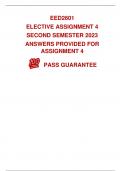Other
EED2601 ASSIGNMENT 4 2023, SECOND SEMESTER ELECTIVE ASSIGNMENT
- Course
- Institution
ASSESSMENT 04 MARKS: 100 This assessment is ELECTIVE and contributes 25% to your final mark for this module. Answer ALL the questions. Answers are provided for all Questions declaration and bibliography
[Show more]



